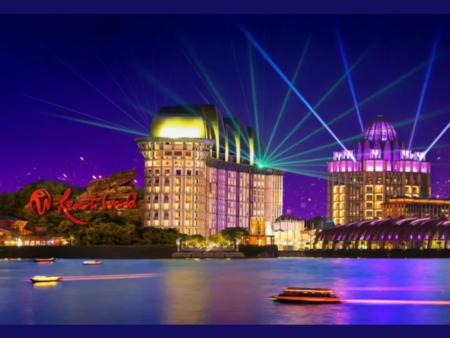The government of Thailand has officially announced its intention to proceed with the development of a mega entertainment complex that will house legal casinos, a move set to revolutionize the country’s tourism and gambling industries. Deputy Finance Minister Julapun Amornvivat confirmed this decision, following a public hearing that saw 80% of participants favor the project. The ambitious initiative, initially supported by former Prime Minister Thavasin, has garnered significant attention, and the current government is committed to seeing it through. The project’s primary objective is to enhance Thailand’s tourism revenue, with an expected annual boost of approximately TBH 12 billion ($340 million).
Thailand’s Legalization of Casinos: A Long-Awaited Move
Thailand, a country renowned for its tourism, has long resisted the full legalization of casinos and gambling. However, the momentum towards legalizing the sector has grown, driven by the desire to prevent Thai citizens from gambling abroad and to capture the economic benefits of a legalized domestic gambling industry. The proposed entertainment complex would be a groundbreaking move for Thailand, bringing the country into alignment with other nations where casino resorts significantly contribute to tourism.
Support From Public and Government
A recent public hearing conducted by the government highlighted strong public support for the entertainment complex. 80% of attendees endorsed the proposal, signaling a shift in public opinion towards gambling. The concept had first been introduced under the leadership of former Prime Minister Thavasin, and though his dismissal temporarily halted the project, it has now been revived with strong backing from the new administration. The current Prime Minister’s father has been an outspoken advocate for the project, ensuring its momentum continues.
Casino Bill Draft and Regulatory Framework
In August, the government unveiled the Casino Bill draft, which offered a framework for the entertainment complex. The bill outlines stringent regulatory measures to ensure the responsible management of casino operations. Among the key elements of the bill is a 30-year initial license for casinos, with a renewal process every 10 years. This extended license period allows for sustained growth and development within the gambling sector, providing a stable business environment for operators.
Licensing Costs and Requirements
Under the proposed regulations, casinos will be required to pay an upfront licensing fee of TBH 5 billion. Additionally, they must pay an annual fee of TBH 1 billion. These fees are to be managed by the Entertainment Complex Policy Committee, the regulatory body overseeing the project. Casinos will also be subjected to a 17% tax on their gaming revenue, a measure designed to generate significant government income while ensuring fair regulation of the gambling sector.
Entrance Fees and Thai Gamblers
One of the project’s most discussed aspects is the casino entrance fee for Thai citizens, which will not exceed TBH 5,000 per person. The entrance fee serves as a gatekeeping measure to ensure that only serious players partake in gambling activities while deterring those at risk of problem gambling. Thai gamblers are expected to make up a significant proportion of the casino’s clientele, accounting for 90% of the expected customers. This localized approach to gambling ensures that the entertainment complex will cater primarily to the domestic market, with international tourists also playing a vital role.
Economic Impact and Revenue Generation
The entertainment complex is projected to generate TBH 12 billion ($340 million) in additional tourism revenue annually. This influx of capital will not only strengthen the national economy but also boost local businesses, including hospitality, retail, and transport industries. With Thailand already a top tourist destination, the casino project is expected to enhance the country’s appeal to both domestic and international visitors.
Attracting International Tourists
Thailand’s government is hopeful that the mega entertainment complex will elevate the country’s status as a global tourist hotspot. The entertainment complex is strategically designed to compete with established casino hubs such as Macau and Singapore. Offering more than just gambling, the complex will feature a range of world-class amenities, including luxury hotels, shopping centers, and entertainment venues, creating an all-in-one experience for tourists.
The Global Casino Market and Thailand’s Entry
Globally, the casino and gambling industry has proven to be a lucrative sector, with countries such as the United States, Australia, and China (through Macau) reaping immense financial benefits. Thailand’s entry into the legal gambling market presents a unique opportunity for the country to capture a portion of this global revenue. By establishing its own regulated casino industry, Thailand can prevent capital flight, where Thai gamblers travel abroad to places like Cambodia and Singapore to gamble. The entertainment complex would allow these players to remain within the country, contributing to the local economy.
Challenges and Considerations
While the potential economic benefits are clear, the project is not without challenges. Gambling addiction is a major concern, and the government has outlined strict regulatory measures to mitigate these risks. The Entertainment Complex Policy Committee will oversee all gambling activities, ensuring that casinos adhere to responsible gaming practices. Additionally, the tax revenue generated from the casino sector is expected to be used for social welfare programs, including efforts to address gambling addiction and support community initiatives.
Future Prospects for the Entertainment Complex
As Thailand moves forward with the entertainment complex plan, the potential for expansion into other cities and regions is a real possibility. Should the first phase of the project prove successful, the government may consider establishing additional complexes in other tourism hotspots, further boosting the country’s economy. The introduction of online gambling regulations could also be explored as part of the broader strategy to modernize the gambling sector.
Conclusion: The Decision
Thailand’s decision to move forward with the mega entertainment complex represents a significant shift in the country’s stance on gambling. With strong public support and a clear regulatory framework, the project is poised to elevate Thailand’s status in the global gambling market. By focusing on responsible gambling practices and leveraging the country’s tourism potential, the entertainment complex is set to provide long-term economic benefits and position Thailand as a key player in the Asian casino market.
FAQs About Thailand’s Mega Entertainment Complex and Casino Project
1. What is Thailand’s mega entertainment complex project?
Thailand’s mega entertainment complex is a government-backed initiative that includes the construction of a large entertainment center, complete with legal casinos, to boost tourism and the gambling sector in the country. The complex aims to attract both domestic and international tourists, contributing significantly to the national economy.
2. What is the expected economic impact of the entertainment complex?
The entertainment complex is projected to generate an additional TBH 12 billion ($340 million) in tourism revenue annually. This boost will strengthen the national economy and benefit various local businesses, including hospitality, retail, and transportation sectors.
3. Why did the government decide to proceed with the casino project?
The project received strong public support, with 80% of attendees at a recent public hearing favoring the plan. The government aims to prevent Thai citizens from gambling abroad by offering a regulated domestic option while capturing the economic benefits of legalizing casinos.
4. Who will be the primary customers for the casino?
It is expected that 90% of the casino’s customers will be Thai citizens. The government has also introduced a casino entrance fee of no more than TBH 5,000 per person to regulate access for local players.
5. What are the licensing requirements for casinos in Thailand?
Casinos will be granted an initial 30-year license, with a renewal process every 10 years. The upfront licensing fee is TBH 5 billion, and casinos must also pay an annual fee of TBH 1 billion. A 17% tax on gaming revenue will also be imposed.
6. How will the project affect Thailand’s tourism industry?
The entertainment complex is expected to elevate Thailand’s appeal to international tourists and enhance its reputation as a global tourist destination. By competing with casino hubs such as Macau and Singapore, the complex will attract more visitors to the country.
7. Who is overseeing the project’s development and regulation?
The Entertainment Complex Policy Committee is responsible for regulating the complex’s development, issuing licenses, and ensuring casinos operate within a legal and responsible framework.
8. What are the challenges of the casino project?
One of the key concerns is the potential for gambling addiction. The government is implementing strict regulatory measures to promote responsible gambling and is planning to use the tax revenue from the casinos for social welfare programs and to address gambling addiction.
9. What amenities will the entertainment complex offer?
The complex will offer more than just gambling. It will feature luxury hotels, shopping centers, and entertainment venues, creating a comprehensive experience for tourists.
10. Could this project expand to other regions in Thailand?
If the initial phase of the entertainment complex proves successful, the government may consider expanding to other cities and regions. This could further boost the economy and attract more tourists to various parts of the country.
11. What is the role of the Prime Minister’s family in the project?
The current Prime Minister’s father has been an outspoken supporter of the project, ensuring continued political backing and momentum for the casino and entertainment complex.


















